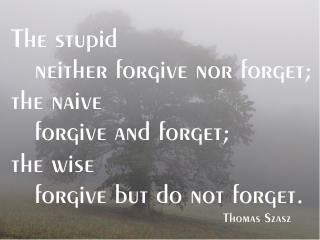










Popular Articles
Crazy-Makers: Dealing with Passive-Aggressive People
Why Are People Mean? Don't Take It Personally!
Struggling to Forgive: An Inability to Grieve
The Secret of Happiness: Let It Find You (But Make the Effort)
20 Steps to Better Self-Esteem
7 Rules and 8 Methods for Responding to Passive-aggressive People
What to Do When Your Jealousy Threatens to Destroy Your Marriage
Guide to How to Set Achieveable Goals
Catastrophe? Or Inconvenience?
Popular Audios
Audio Version of Article: Crazy-Makers: Passive-Aggressive People
Audio Version of Article: Why Are People Mean? Don't Take It Personally!
More PsychNotes: Anger, Conflict, and Forgiveness
Perspective, Empathy, and Forgiveness
by Monica A. Frank, PhD
Forgiveness is the most precious but arduous gift a person can give to another. We struggle with forgiveness because we are in pain, we are angry that someone caused that pain, we want them to hurt as much as we do but we believe they don't feel regret, guilt or shame.
Yet, in many situations the struggle with forgiveness is due to an overestimation of the intent of the offender and an underestimation of their desire to be forgiven (Adams and Inesi, 2016). When a person is hurt by another, the tendency is to believe that the other person did it deliberately and doesn't care about the pain they caused.
However, in many situations that assumption is not true. Frequently, the transgressor didn't intend to cause pain and desires to be forgiven. Forgiveness is a requirement of healthy relationships because none of us are perfect and each of us is likely to be in the role of an offender and of a victim at different points in a relationship.
What needs to be considered when choosing to forgive?
1) Seriousness of the offense. Realistically, how consequential was the behavior? In other words, what impact did it actually have in your life? Sometimes people focus on insignificant behaviors because of unrealistic expectations. To evaluate a behavior, it is necessary to look at how the behavior affected your life beyond hurt feelings.2) Nature of the relationship. How important is the relationship? Some relationships may not be worth the effort to repair. Whereas others can even survive serious offenses when the transgressor is remorseful and takes action to prevent causing further pain.
3) Benefit to the victim. What is the benefit of forgiving to you? Even in those situations when the relationship is not worth repairing it can be worthwhile to come to some level of acceptance so that the anger, pain, and bitterness doesn't consume you.
4) Acceptance of responsibility. Has the offender taken responsibility for the behavior? Forgiveness is a two-way street. To facilitate forgiveness the offender should let the wounded party know how much s/he is remorseful and desires forgiveness. By taking responsibility for his/her actions the offender can help repair the relationship.
5) Repetition of behavior. Does the offense occur again and again even when the offender has shown remorse and asked for forgiveness? Repeated offenses may indicate that the offender hasn't truly taken responsibility for the behavior because an important aspect of responsibility is to change the behavior.
Taking the Perspective of the Offender
After taking these questions into consideration and you decide to forgive the transgressor, how can you proceed? Researchers Gabrielle Adams and Ena Inesi showed that when a victim takes the perspective of the offender they can more readily develop a forgiving attitude. To do so, they asked the research participants to empathize with the offender:“..try to empathize with John. Imagine how John feels as this occurs. Picture to yourself just how he feels in this situation. You are to concentrate on the way he feels. Think about his reaction to you. In your mind’s eye, you are to visualize how it feels to be John in this situation.”Obviously, such an exercise needs to only be undertaken if you have assessed the situation and determined that it is in your best interests to empathize. Sometimes, empathizing too much can cause us to naively assess the situation and forgive too readily.
And finally, we need to use evidence to evaluate relationships. As Thomas Szasz said, “the wise forgive but do not forget.” If we forgive and forget we may be victimized repeatedly, either by the same person or the same type of situation. Remembering helps us to assess the genuineness of the transgressor's desire to repair the relationship as well as helps us to avoid similar situations in the future.
Adams, G.S. and Inesi, M.E. (2016). Impediments to Forgiveness: Victim and Transgressor Attributions of Intent and Guilt. Journal of Personality and Social Psychology, 111, 866–881. DOI:10.1037/pspi0000070
Copyright © 2017 by Excel At Life, LLC.
Permission to post this article is granted if it includes this entire copyright and an active link.
Permission to post this article is granted if it includes this entire copyright and an active link.














